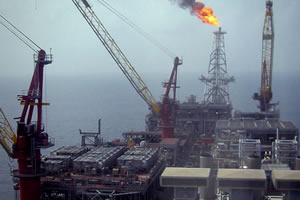The nation’s vulnerability to the adverse impacts of climate change will cost it dearly, according to an expert.
 Dr Victor Fodeke, formerly Nigeria’s climate chief, is particularly worried over the threat of extensive damage to petrochemical industrial installations presently concentrated in the coastal belt from sea-level rise. According to him, the numerous industries clustering around Nigeria’s seaports are seriously threatened by sea level rise.
Dr Victor Fodeke, formerly Nigeria’s climate chief, is particularly worried over the threat of extensive damage to petrochemical industrial installations presently concentrated in the coastal belt from sea-level rise. According to him, the numerous industries clustering around Nigeria’s seaports are seriously threatened by sea level rise.
He said: “Most petrochemical industrial installations are concentrated along the coastal zones as offshore and onshore installations in the country. Accelerated sea level rise associated with climate change poses significant threat to all these critical economic installations. In an event of extreme climate change hazard of sea level rise, not only lives will be lost, irreparable damages would occur in all our oil installations due to the rising ocean wave.”
According to him, extreme climate change has being predicted could result in failed states, saying that it is on record that over 90 percent of the nation’s economy depends on oil and gas.
“Apart from the attendant human calamities, the country’s foreign earnings will be affected and this will in turn affect the country’s economic performance both in the short and the long runs. The coastal states of Nigeria play a national strategic role of economic, environmental, social, political and security significance, and should be designated as such,” he said.
He stresses that failure to plan is the surest way to hasten such a disaster, saying that this is a wake-up call to the coastal states in the country to arise to defend Nigeria for sustainable national development and Millennium Development Goals (MDGs).
“Given the current level of development, with the projected climate change and sea level rise of 0.5m and 1.0m, the capital value at risk would be about $8.05 billion and $17.5 billion respectively. With 30-year development and population growth of 5 percent and, without any measure, the capital value at risk would be between $20.13 billion and $43.13 billion.”
Fodeke stressed that the nation’s energy sector is also vulnerable to the impacts of response measures, which are measures being taken by the developed countries Parties to the Convention and the Protocol in their various countries to reduce greenhouse gas (GHG) emissions.
“A specific example is the introduction of carbon tax on consumption of petroleum. Since the source of greenhouse gas emissions, to a very large extent, is the production and consumption of fossil fuels, both the Convention and the Protocol are largely targeting carbon dioxide (CO2) emissions and by extension, fossil fuels including oil, gas and coal. An increased carbon tax will lead to a reduction in the consumption of these fuels under the guise of combating climate change which is injurious not to Nigeria economy alone but also to the economies of fellow Organisation of Petroleum Exporting Countries (OPEC) countries, whose economies largely depend on foreign earnings from sales of fossil fuels.
“Nigeria’s offshore and onshore coastal zone (800km. in length) is rich in biodiversity, and could be vulnerable to climate change impacts. The region also harbours a lot of infrastructure, particularly those related to the oil and gas industry, which are equally vulnerable to climate change impacts. Sea level rise (SLR) will bring about coastal inundation which may destroy coastal infrastructure and biodiversity and salinisation of coastal fresh water resources. Storm surges, higher waves and flooding will accelerate the incidence of coastal erosion and beach destruction. Severe coastal inundation may lead to the displacement of population and the incidence of migration, with accompanying social disharmony.”
Fodeke emphasised that the most important significant impact of climate change on energy will include higher electricity demand for heating, cooling and pumping water, and reduced availability of hydroelectricity and fuel-wood.
“Inadequate supply of power is already forcing the closures of many industries thereby rendering several Nigerians jobless. This, in turn, will aggravate our macroeconomic problem of unemployment and accelerating poverty. Products from such industries become unavailable and where available through importation, the prices are beyond an average Nigerian.”
He urged the authorities to deploy and foster the use of sustainable, less carbon intensive, clean-energy and climate friendly technologies, from mitigation and adaptation view points.
“This cannot be overstated if Nigeria is to achieve the MDGs. Transfer of such technologies that should enhance our efforts towards implementation of the Convention and the Protocol are yet to come from the industrialised countries that have a duty to work assiduously towards the implementation of the UNFCCC and the Kyoto.”
